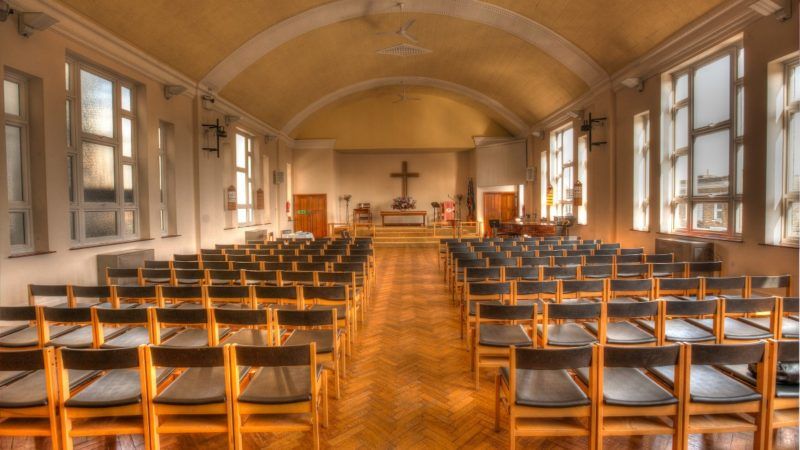Justice Department Warns California Not To Leave Churches Behind in Its Reopening Plans
Allowing schools and malls to reopen, but not places of worship, would raise civil rights issues

The Department of Justice is warning the State of California that its rules for the reopening of churches and religious services, which appear to be more burdensome than the requirements for similarly risky businesses and commercial enterprises, could be a civil rights violation.
California, like most other states, is working on a phased reopening of the state in response to the COVID-19 pandemic. Residents of the state are under strict "stay at home" orders that have become sources of conflict and protest for being overly broad and preventing people from gathering in outdoor spaces (like beaches), even when people voluntarily engage in social distancing.
A blanket ban on live church services has led to lawsuits from residents in Lodi, Fontana, and San Diego County arguing that the bans violate First Amendment rights to the free expression of religion. Many federal judges have thus far upheld these restrictions as serving public health. Judge Jesus Bernal for the U.S. District Court for the Central District of California, noted that thus far the bans on religious gatherings in the state were comparable to the closures of schools, concerts, and sports gatherings, and therefore churches weren't being singled out for special treatment. The bans were being neutrally applied to serve a government goal to protect public health and reduce the spread of the coronavirus.
That distinction is important because there have also been clear cases where churches and religious services were being targeted and treated differently. In Louisville, Kentucky, Mayor Greg Fischer attempted to ban drive-in Easter church services, while other drive-through businesses, like fast-food restaurants and liquor stores, were permitted to remain open and serve customers. Not only did Fischer's ban unconstitutionally target protected speech, the ban wasn't even serving a public health goal.
It's under this court guidance that churches cannot be treated differently from similar nonreligious activities that the Department of Justice sent its warning letter (read it here) to California Gov. Gavin Newsom. Newsom's and the California Department of Public Health's plan to reopen in phases allows for some commercial and business spaces to open while keeping a ban on public gatherings for religious services.
Eric Drieband, assistant attorney general for the Justice Department's Civil Rights Division, warned Newsom on Tuesday that the state appears to be unequally treating religious gatherings in two ways.
First, Drieband notes that the guidance from the state's list of "critical infrastructure workers" allows for a lot of employees to continue to work in offices if it "is not practical" for them to work remotely. But the Justice Department believes the expansive list of exceptions is not confined to workers that are involved in maintaining essential goods and services. The letter points to permission to work for "workers supporting the entertainment industries, studios, and other related establishments, provided they follow COVID-19 public health guidance about social distancing" and also "workers supporting ecommerce" as examples of the state allowing nonessential private commercial and business gathering while still banning religious gatherings.
Second, Drieband notes that California's phased plan will allow some counties to reopen places like schools, restaurants, and malls in an earlier stage (with reduced capacities) while excluding churches until the next phase. Drieband says these guidelines are possibly running counter to court precedents that generally forbid laws and regulations that treat churches and religious institutions differently than non-religious institutions.
"The Department of Justice does not seek to dictate how State such as California determine what degree of activity and personal interaction should be allowed to protect the safety of their citizens," Drieband writes. "However, we are charged with upholding the Constitution and federal statutory protections for civil rights. Whichever level of restrictions you adopt, these civil rights protections mandate equal treatment of persons activities of a secular and religious nature."
Drieband concludes by calling on California to do more to accommodate churches that want to reopen and to consider including them in the same phase with schools and malls.
Newsom's office has not responded to media requests for comment about the letter. Newsom has very notably responded to the pandemic with broad claims of executive power to shut down beaches and parks and to require residents to stay at home. Resistance by the public has led to slow and somewhat confusing relaxation of restrictions and reopening of public spaces.
As Reason's Eric Boehm noted on Monday, it's unfeasible for states (especially large ones like Texas and California) to enforce these massive lockdowns in the long term. If large numbers of people decide to congregate at churches across the state, there will be little Newsom could do about it. Making sure to include churches with malls and restaurants would lessen resistance and encourage careful reopening with voluntary social distancing.
This post has been updated to correct that churches are included in a later phase of California's reopening plan.
